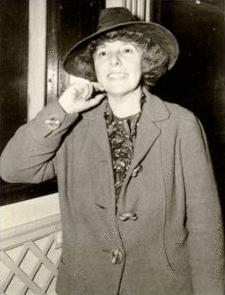Dorothy Kenyon facts for kids
Quick facts for kids
Dorothy Kenyon
|
|
|---|---|
 |
|
| Born | February 17, 1888 New York City, New York, U.S.
|
| Died | February 12, 1972 (aged 83) New York City, New York, U.S.
|
| Education | Smith College (BA) New York University (LLB) |
| Occupation | attorney, judge |
Dorothy Kenyon (February 17, 1888 – February 12, 1972) was an important American attorney, judge, and activist. She was a strong supporter of civil liberties and women's rights.
During a time called McCarthyism, she was wrongly accused of being connected to certain groups. Dorothy Kenyon was a powerful speaker. She often traveled across the U.S. to give talks about freedom, laws, and equality for women.
Contents
Early Life and Education
Dorothy Kenyon was born in New York City. Her parents were Maria Wellington (Stanwood) and William Houston Kenyon, who was also a lawyer. She grew up in Manhattan and spent summers in Lakeville, Connecticut.
She finished Horace Mann School in 1904. Then, she studied economics and history at Smith College, graduating in 1908. At college, she played field hockey and tennis.
After college, she spent a year in Mexico. There, she saw a lot of poverty and unfairness. This experience made her want to help others. She decided to focus on social activism. She then went to New York University School of Law. She graduated in 1917 and became a lawyer in New York that same year.
A Career Fighting for Justice
Dorothy Kenyon began her legal career in 1917. She worked as a law clerk in a New York firm. Later that year, she helped lawyers who were advising delegates at the Paris Peace Conference. She studied how people worked during wartime and gathered economic information.
For most of her career, Dorothy Kenyon worked hard for social justice. She supported many important causes. These included the New Deal, which helped people during the Great Depression. She also fought for women's rights, the rights of workers, and consumer cooperatives.
In 1930, she started her own law firm, Straus and Kenyon, with Dorothy Straus. They worked together to help women advance. In 1939, Dorothy Kenyon became a judge in the municipal court. She also became a U.S. representative in 1938. She joined a group called the League of Nations Committee for the Study of the Status of Women. This group studied women's legal rights around the world. Later, from 1946 to 1950, she was a U.S. delegate to the United Nations Commission on the Status of Women.
Standing Up to Accusations
In 1950, Dorothy Kenyon became national news. Senator Joseph McCarthy accused her of being involved with groups that were thought to be linked to communists. McCarthy claimed she was a member of many such organizations.
Dorothy Kenyon bravely fought back against these accusations. She said, "He's a lowdown worm... he's a liar and he can go to hell." She strongly denied being a supporter or member of any communist-controlled group. Many people, including Eleanor Roosevelt, supported her. A Senate committee later cleared her of all charges. However, McCarthy's accusations unfortunately ended her career in public service.
Continuing the Fight for Rights
Even after the McCarthy accusations, Dorothy Kenyon kept fighting for justice. In the 1950s and 1960s, she worked with the National Association for the Advancement of Colored People (NAACP). She also worked for the American Civil Liberties Union (ACLU). She pushed the ACLU to fight against unfair policies toward women. For many years, she was the only woman on the ACLU board.
She worked with Pauli Murray, another African-American activist and lawyer. Together, they prepared legal arguments for cases that challenged unfair treatment based on gender. Dorothy Kenyon also supported the Equal Rights Amendment. This amendment aimed to guarantee equal legal rights for all American citizens regardless of sex. She joined younger feminists in the growing women's liberation movement. In 1971, she took part in the Women's Strike for Equality.
In 1966, Dorothy Kenyon and Pauli Murray won an important case called White v. Crook. In this case, a court ruled that women have an equal right to serve on juries. Later, when future Supreme Court Justice Ruth Bader Ginsburg wrote her legal brief for the 1971 case Reed v. Reed, she recognized the important work of Murray and Kenyon. She listed them as coauthors to honor their contributions. This case was the first time the Fourteenth Amendment's Equal Protection Clause was used to protect women's rights.
Later Life and Legacy
Dorothy Kenyon was a very independent person. She chose not to marry. She was very active in President Johnson's War on Poverty. Even at 80 years old, she worked hard to create legal services for people who couldn't afford them in New York City.
When she became ill in 1969, she kept working. She continued her legal and political activities until she passed away on February 12, 1972. This was just five days before her 84th birthday.
Dorothy Kenyon's papers, which include her personal and professional documents, are kept at the Sophia Smith Collection at Smith College. These papers show her lifelong dedication to social justice.
In Popular Culture
Dorothy Kenyon is shown in the 2018 film On the Basis of Sex. Actress Kathy Bates plays her in the movie. The film is about the life and career of Ruth Bader Ginsburg.
 | William M. Jackson |
 | Juan E. Gilbert |
 | Neil deGrasse Tyson |

